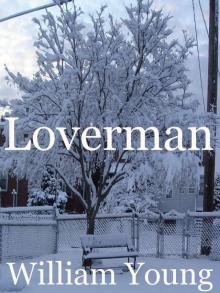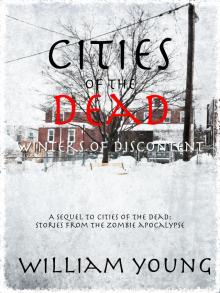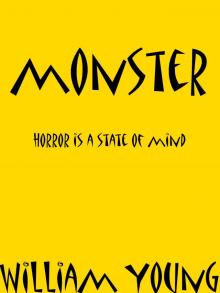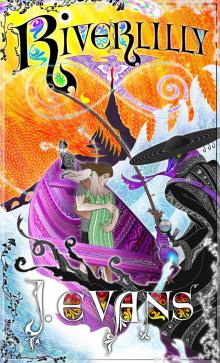- Home
- William Young
Riverlilly Page 16
Riverlilly Read online
Page 16
Chapter the Twelfth,
The Day Before the Last,
In which a secret ingredient is found.
I. Unearthly
Ceder woke at first light and peeked over the side of the boat, greatly surprised to find that last night had not, in fact, been a dream. Golden sunlight seeped through the twisted tree branches that enclosed the lagoon. White apples hung from every limb, but if Ceder thought they were aglow last night, now she could not be sure if it had only been the moonlight playing tricks on her eyes.
She turned to find the fisherman standing waist-deep in the water by the side of the boat, staring at her. She flinched back, unnerved to consider that he had been standing there all along.
“Oh, you’re awake? Good,” said the Dangler. “I’m making eggs.”
Ceder rubbed her ears, not sure she had heard right.
“Fried or scrambled?” asked the Dangler.
Ceder lurched forward to stir Jai awake. She grabbed his satchel before he could sit up properly and checked inside, fearing the worst, but to her relief the enchanted eggs were still safely tucked within.
The fisherman returned to his floating log, facing the whirlpool, his back to the children. “How many can you eat?” he called over his shoulder. There was a spark of vigor to his voice that had not been there the night before.
“I could eat a hundred,” said Jai, yawning and stretching his arms.
The Dangler jumped in surprise. “A hundred! My word, a whopping appetite!” He stood up from his log and waded to the edge of the lagoon. “This may take a while,” he said as he disappeared into the maze of dark trees.
Jai and Ceder looked at each other, stunned, then they broke out laughing. When they had settled down, Jai asked Ceder whether her nightmares had returned.
She shook her head. The corners of her mouth twitched up in a smile, dimpling her cheeks. “I think I’m cured, after all. Isn’t that great?”
Jai nodded, then pretended to get a drink of water from over the side of the boat. He stared at his reflection in the lagoon. If the King cured her, after all, why didn’t the Queen cure me, too? he asked himself. Is it because of Sorid’s mark? Can it not be erased? Ceder gets to live, while I dry up and die?
“I dreamt, Jai. I’ve never had a good dream before. I dreamt all night.”
“About what?” Jai mumbled sullenly.
“Unicorns. Wishing Wells. Castles in the sea. And then I dreamt we found a place where the water was pure silver.”
Jai looked up at her, but Ceder had already shyly turned her eye. He sat on the bench next to her. Their bare shoulders met, so they sat perfectly still, neither wishing to change position, both too nervous to speak.
Why flew into the sky, overjoyed for a chance to stretch his wings out properly. He called down to the children that the view was indescribable, then he spent the next several minutes describing it. The children, for the most part, let the butterfly’s words blow in one ear and out the other.
Astray leapt into Ceder’s lap, seeking an affectionate hand. She ran her fingers down his head but stopped at the base of his neck where the white patch of fur had begun to glow the previous evening. The patch was small, no shape in particular. Ceder put her hand over the white spot. “It’s warm,” she said to Jai.
“Ceder, why do you think the King and Queen brought Astray to us?”
She thought about it. “Every time we get stuck, he jumps ahead to show the way. I think he’s here to guide us. Like the stars that sailors use.”
“If the King and Queen wanted to give us a guide, a working compass might have helped.” Jai studied the mysterious cub. “But what is he? Where did he come from? And why was he in the middle of the sea to begin with? Not to mention those flower petals…”
Ceder swam her hands through the cub’s rich fur. “I don’t know, Jai.”
“What are we going to do next?” he asked a moment later. “Where will we go? Did you notice there’s no way out of here? We lost the river.”
Ceder surveyed the lagoon, then turned her attention back to Astray, who gave Jai a sleepy grin.
The Dangler stepped out of the trees into the water with strides as high as a stork. In his arms was a small mountain of eggs, every shade of gray and brown, spotted, speckled, large, and small. He smiled widely; the children flinched—the sight of his dark glass face flexing and contorting was still a shock to behold.
“I was only joking,” said Jai, his cheeks flushing pink, “I can’t eat that many.”
The fisherman’s smile slowly turned upside-down. He waded despondently to the whirlpool and dumped the mound of eggs into the swirling vortex with a dejected sag of the shoulders.
“Wait!” cried Jai. “We’re still hungry! Don’t throw them all away!” But it was too late—the Dangler turned around empty-handed. Jai moaned. Then the fisherman flicked his wrist—with sleight of hand too fast to see, he was suddenly holding an egg in between each of his long fingers.
The Dangler turned his back to the children, holding his arms aloft like a conductor beginning a symphony. He clapped his hands together smartly and the eggs shattered apart. He dripped the yolks onto the flat stones that surrounded the whirlpool then cast the leftover shell fragments into the spinning water.
The eggs sizzled on the hot rocks. The fisherman pulled an unseen ingredient from his tackle-bag, which he then proceeded to cut up and heap into the eggs. The children could not see what the fresh addition was.
All at once the Dangler picked up his fishing pole and, with a quick snap, sent the line of flowing water soaring gracefully through the air into the pink boat, where the hook stuck in the wood like a bur. He gave a sharp tug and the boat floated quickly over to the circle of stones at which he was preparing their breakfast.
At the same time as he retrieved the boat, the fisherman shot his other hand into his tackle-bag and produced three travel-worn, tarnished plates. With a skillful swoop, he scooped up three eggs onto each plate, then tossed the plates onto separate stones just as the boat sidled up.
The eggs were as thick as steaks, but Jai and Ceder were both disappointed to find that the fisherman’s secret ingredient was diced apples—the tiny cubes gave off an unearthly white glow.
“Apples and eggs don’t belong together,” said Jai. “It feels like having the sun and the moon out at the same time.”
“All things come together in the end,” said the fisherman, “even the sun and the moon, even the sea and the sky, even fire and water.”
Jai sniffed at the meal skeptically.
“Why are the apples here white?” asked Ceder. “Apples are supposed to be red.”
“Red apples grow in the sun, white apples grow in the moon, and neither falls far from the tree.”
“How can something grow in the moon?” asked Jai.
The Dangler pulled a glowworm out of his bait-bag and held it wriggling between his long fingers. The children clearly saw the native crescent mark on its head, dim in the daylight.
“That’s much bigger than any worm I ever saw,” said Ceder.
“Glowworms feed on moonlight,” said the Dangler. “White apples are better for their diet than reds.”
He put the worm away and then flourished a pair of tin forks in one hand as if they had been concealed up his cuff all along. With a deft toss he sent them flying directly into the eggs in front of Jai and Ceder, striking both dead center—the forks quivered back and forth like arrows hitting a target.
“Eat up!” said the Dangler, sitting back on his log and casting his fishing line into the whirlpool once again.
Ceder poked at her food mistrustfully, clearly thinking about all the cursed apples she had been force-fed during her lifetime. “Eat this?”
Jai peckishly separated the diced apples from his eggs. Meanwhile, Astray gobbled his food down in no time and licked the plate clean, then looked to the children to see if they were going to finish theirs.
The fisherman was crestfallen that the child
ren did not implicitly trust his cooking. “I thought you would be hungry,” he sighed, looking so down on himself that Jai and Ceder both raised a bite to their lips, if only out of pity.
The eggs, it turned out, were expertly roasted. The white apples tingled on the tongue like sparkling wine. “I told you my story last night,” said the Dangler, “now tell me yours. Why are you here?”
With their cheeks stuffed full of food, Jai and Ceder looked at one another, wondering whether it was a good idea to disclose the chain of trials that had led them to the lagoon. After a moment of silence, and primarily to avoid hurting the fisherman’s feelings, the children opened up. In between mouthfuls, but mindful not to forfeit a single crumb to sloppy storytelling, they related to the Dangler the most outlandish elements of their adventure thus far: Jai told him about Sorid, Seaweed, and Astray’s strange arrival; Ceder filled in their encounters with Ghazahg, Coral Wing, and the Sands of Syn. When they finished speaking they licked their empty plates clean as voraciously as had the cub.
Jai picked up Astray’s plate and stacked it on his own, handing the pile to Ceder; she handed them all back to the Dangler; he dipped the plates in the whirlpool to clean them, then slipped them back inside his bag. “You two had quite a journey,” he said as placidly as though he was discussing the weather, “but I daresay the next couple of days will be even more eventful. Shall we be off?”
II. Sudden Motion
Jai and Ceder looked at one another, each trying to silently sway the other to tell the Dangler the unpleasant truth that they had been advised not to follow him. Jai looked down first, then he turned to the fisherman. “You can’t come with us.”
The Dangler stared at him, confused.
“Breakfast was great and everything,” said Jai, “but we don’t need any more help.”
“Aside from me showing you the way out of here,” said the Dangler.
Jai blinked several times. “Yes, aside from that.”
“The river is dangerous,” said the fisherman.
“We’ll be fine,” said Jai. “I have a knife.”
The Dangler said no more.
Ceder could not bear the dejected cast of his expression. “You’ve been very kind to us so far,” she blurted out, “but we were warned not to follow you. We don’t know why! We’re sorry!”
The Dangler took a moment to sort his thoughts, morbidly adjusting his pole by increments so small it could not have made a difference even if there were any fish to catch. “On the river, you will not follow me. We will all be following the current.”
Ceder looked doubtful. Jai looked back and forth between her and the fisherman, determined not to miss the cues of another unspoken conclusion.
“And if I ride along behind you on my log,” said the Dangler, “would it not indeed be me who was following you?”
Ceder was impressed—she had not thought of that. The King and Queen sent us to the river, and the Oldest Fish in the Sea told us it will lead us back to Sorid. If that’s true, then what harm could it be to let the Dangler tag along? He might be more useful than he seems—there’s something about him I can’t quite grasp, like trying to pick up a fish with bare hands.
“Ceder?” Jai tapped her arm. “What should we do?”
She turned to the Dangler. “Show us the way.”
The fisherman ferried his log over to the boat. “If I just hook my line to the back of your boat, we can be along.”
“Nonsense,” said Ceder. “You can sit in the boat with us.”
“Yeah,” said Jai, “you can… wait.” He turned to Ceder. “What?”
“You don’t expect him to go the whole way sitting on that dumpy old log, do you?”
Although there was enough room for the fisherman, Jai was not inclined to share the cozy space that he enjoyed with Ceder, and yet neither could he bring himself to argue the point with her and risk her disapproval. “Not when you put it like that,” he conceded.
The Dangler looked from Ceder to Jai and back again.
“Come on,” said Ceder. “We don’t have all day.”
The Dangler lifted one lanky leg out of the water into the rear of the boat. The children saw for the first time that he wore long black trousers—soaking wet and clinging wetly to his legs—tucked into high leather boots with rusted silver buckles.
Water dripped off his clothes and formed a puddle in the bottom of the boat. Oblivious to the mess he was making, he pulled his cape in front of him and wrung it out in both hands like a wet towel. When it was dry, he threw it back over his shoulder, only to land behind the boat in the water again. “I know there is an exit around here somewhere.” He spent a long minute turning around in circles. “Where is the dam?”
“The damn what?” Jai asked petulantly.
The Dangler gave him a warning look, then pulled a compass out of his breast pocket. He hunched over the dial and tapped it with one finger, trying to get a solid reading.
“Hey!” said Ceder, recognizing the waveglass object at once, “that’s our compass! How did you get that?”
The fisherman looked up, foiled by the uncooperative instrument. “It fell out of the sky this morning while you two were sleeping,” he informed her as if such occurrences were commonplace. “I caught it before it landed in the water.” He held the compass out in his hand, offering it back to the children. “It seems to be broken. The needle points straight back at me no matter where I turn.”
“It’s not broken,” said Ceder, “but there’s no way it could have fallen from the sky. Jai threw it in the big whirlpool last night, way down below.”
The Dangler rubbed his chin in thought, then held the compass above his head, upside-down so he could still see the needle. It pointed steadily east. “There she is,” he said under his breath, almost disbelieving. Showing his first sign of enthusiasm since the children had met him, he thrust his arm out toward the rising sun, pointing to a clump of trees and undergrowth that looked the same as all the rest around the lagoon.
“Oh, great,” said Jai, “another invisible door.”
The Dangler frowned. “Invisible? Can you not see the trees?”
“We’re going through the trees?” Jai squeaked, picturing a headlong crash through the woods.
“Hold on tight!” The Dangler raised his fishing pole and whipped it forward. The watery line sailed through the air and the hook landed in a tangle of dense foliage. He gave the pole a mighty tug and the boat jerked into sudden motion toward the embankment.
Jai and Ceder ducked down just as the hull smashed into the undergrowth. The Dangler hollered with exhilaration as they burst through the barricade, knocking a wall of buried, moss-covered logs out of the way.
The logs and uprooted flora swiftly floated ahead of the pink boat only to disappear downward over a sharp horizon. The children had only seconds to see that the Dangler’s lagoon was no more than an isolated pool and a grove of apple trees on top of a steep mountain summit.
The boat tipped over the edge.
The Year One Hundred,
The sky was dark when the Riverlilly arrived at the eastern shore. Two green ogres eyeballed the boat covetously as it made its way toward them. They cracked the knuckles of their wart-infested fingers and told one another that they were not going to share such a colorful trinket as this, no, not after waiting as long as they had, through the grinding of a century. Behind the ogres a sea of rolling dunes sparkled with the gold that was stowed under the sands. The massive brutes were in the business of excising tolls from those who sailed the river; the coin they bullied from such hapless travelers—one hundred years’ worth of ill-gotten gains—was hoarded in vast piles underneath the desert.
The greedy ogres bent down and scooped the empty boat out of the water, fighting over who would keep it. No larger in their hands than a toy ship, the boat seemed to shrink amidst their fumbling fingers, now the size of a wheelbarrow, now an oak leaf, now the size of a flower petal. The ogres growled and snarled as their fight g
rew more vicious, their escalating fury honed to a keen edge.
The boat shrank to the size of a penny, then to the size of an El fish, and then it was gone, just as the sun peeked over the eastern horizon and dispelled the dark of night. The distracted ogres froze like ice, their flesh made stone, forming an ominous entryway to the river.

_preview.jpg) Waiting for the Great Leap Forward (Cities of the Dead)
Waiting for the Great Leap Forward (Cities of the Dead)_preview.jpg) Days Go By (Cities of the Dead)
Days Go By (Cities of the Dead)_preview.jpg) All Hell Breaks Loose (Cities of the Dead)
All Hell Breaks Loose (Cities of the Dead) The Signal
The Signal_preview.jpg) The Third Time is the Harm (Cities of the Dead)
The Third Time is the Harm (Cities of the Dead)_preview.jpg) The Lazarus Question (Cities of the Dead)
The Lazarus Question (Cities of the Dead)_preview.jpg) What are Little Zombies Made of? (Cities of the Dead)
What are Little Zombies Made of? (Cities of the Dead) Loverman
Loverman Cities of the Dead: Winters of Discontent
Cities of the Dead: Winters of Discontent_preview.jpg) Death Takes a Holiday (Cities of the Dead)
Death Takes a Holiday (Cities of the Dead) Monster
Monster_preview.jpg) The Undeath of Rob Zombie (Cities of the Dead)
The Undeath of Rob Zombie (Cities of the Dead) Riverlilly
Riverlilly_preview.jpg) Killing Country Music (Cities of the Dead)
Killing Country Music (Cities of the Dead)